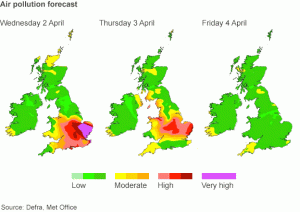Health officials are concerned over the worsening level of pollutants originating from neighbouring European states and from dust blown over from the Sahara that has spread across the border into Wales over the last two days.
The south and south east regions in Wales have experienced moderate to high levels of air pollution today. NHS Wales warned yesterday and today local residents with health problems to take necessary precautions to protect their health.
Medical professionals have warned that those people in Wales living with heart and lung diseases are the most likely to be affected by the decrease in air quality.
According to the 10-point Defra scale on air pollution, the worst affected regions in the UK are at the highest level, while Wales is currently between 5 and 6 on the scale today, which is still very alarming.
Consultant at Public Health Wales Huw Brunt said: “The short term peaks in air pollution will affect some individuals, particularly vulnerable groups such as those with existing heart or lung conditions, may experience increased symptoms.”
“When air pollution levels are high, adults and children with lung and heart diseases, and older people should reduce outdoor activities if they are experiencing some symptoms. People with lung conditions who use a reliever inhaler should make sure that they carry it with them. If they feel their condition is worsening at all, they should contact their GP,” Mr Huw said.
Serious air pollution will have a particular strong impact to people who live with lung diseases, as the air condition is predicted to be in low levels until the end of this week.
Dr Keith Prowse, honorary medical adviser to the British Lung Foundation, said: “Heavy air pollution, of the kind we’re seeing in several places in Wales at the moment, can have a significant impact on people with pre-existing respiratory conditions such as chronic obstructive pulmonary disease and asthma, worsening symptoms such as coughing and breathlessness.
While most people will not be seriously affected by the air pollution in the short term, people who do outdoor exercises are advised to avoid serious polluted areas.
“When levels of air pollution are high, anyone who finds themselves coughing or wheezing in times of high pollution, should avoid strenuous exercise outdoors, particularly around pollution hotspots such as busy roads. If the option is available, exercising in an air-conditioned gym or sports halls is preferable,” Dr Prowse said.
“If they cycle, run or walk to work, commuting at times other that rush hour or along back streets is also advisable,” Dr Prowse added.
Wales is not the only place hit by increased smog levels recently. The pollutant level was unusually high across a wide region of western Europe last month, and some countries are taking urgent actions to tackle the problem. Paris offered a free public transport during the weekend as an incentive for people to avoid car use and to limit traffic emissions. Belgium took measures by reducing the car speed limit in the most affected areas.
Air pollution is the largest contributor to diseases from the environment, according to the World Health Organisation. The global report released by WHO last month revealed that almost 600,000 deaths were due to air pollution in Europe in 2012.
By Chenxi Li
